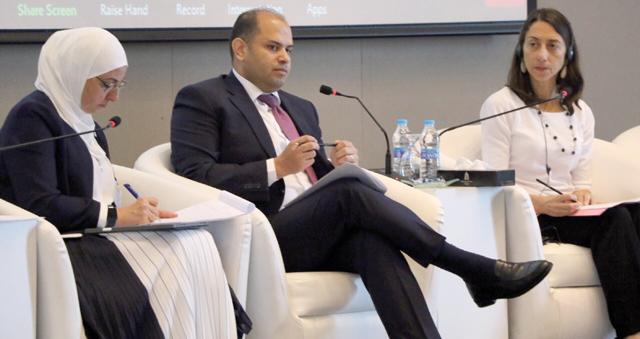You are here
Report highlights need for foreign direct investment to ‘reignite’ private sector
By Batool Ghaith - Jun 22,2022 - Last updated at Jun 22,2022
AMMAN — The launch of the “FDI Qualities Review of Jordan: Strengthening Sustained Investment” report on Wednesday highlighted the need for foreign direct investment (FDI) in the Kingdom following the economic repercussions of the pandemic.
The report was jointly written by the OECD and the government of Jordan, represented by the Ministry of Investment, and measured the contribution of FDI to sustainable development and identified policies to increase its positive impacts, according to an OECD statement.
The government of Jordan is pursuing an “ambitious reform agenda” to “reignite” private sector investment and more widely share its benefits, the report notes.
Jordan can implement more coherent sustainable investment strategies by strengthening coordination across ministries and by engaging in both public-private and social dialogue, the report adds.
The report recommends authorities to adapt policy reforms to the evolving global FDI trends, in addition to digitalisation and climate change, to support the emergence of a more inclusive, greener and knowledge-based economy.
“Attracting FDI that supports sustainable development is particularly relevant in Jordan where FDI is a substantial source of external financing. The FDI stock-to-GDP ratio currently exceeds 80 per cent,” the report says.
According to the OECD statement, the recommendations in the report are based on international practices and standards that can help Jordan leverage FDI to finance the Sustainable Development Goals (SDGs), fulfil the commitments made in the Paris Agreement and optimise the strength and quality of the recovery.
The report highlights the Kingdom’s effort to create a new Ministry of Investment, which hosts all investment-related bodies.
“Beyond efforts in the area of investment, the authorities are undertaking other legal and regulatory reforms to boost competition, streamline tax incentives, address labour market inefficiencies and skills shortages, foster gender equality and advance the low-carbon transition,” the review stated.
Jordan’s renewable energy sector, business, financial and health services, transport and logistics, and ICT sectors have received relatively more FDI in recent years compared to the manufacturing or the construction sectors, according to the report.
These sectors have a “strong potential” to generate economy-wide productivity gains, support a low-carbon transition and create better-paid jobs that can meet the aspirations of Jordanian youth and women, including the highly educated, the report shows.
The report says that various legal and regulatory barriers negatively influence the impacts of FDI on sustainable development in Jordan, such as “lengthy steps” to start a business and legal barriers preventing women from participating in the labour market.
According to the report, opening additional services to FDI could support productivity growth in the Kingdom, while simultaneously supporting progress in other sustainability areas.
The sectors that currently attract the most FDI in Jordan, including real estate, construction and oil and gas-related energy are not the sectors contributing the most to innovation, de-carbonisation or creation of skilled jobs, the report notes.
Secretary General of the Ministry of Investment Zaher Al Qatarneh noted that the report is a reassessment of the current situation in the Kingdom, especially after the pandemic, in a way that helps improve the quality of FDI in achieving sustainable development goals and in line with international trends.
Qatarneh indicated that the report includes two main pillars: First, providing indicators about the impact of FDI, and second, finding a set of policy tools for the best practices for institutional preparation and the necessary mix of policies to provide an opportunity to achieve the benefits of sustainable development for investment.
According to Qatarneh, the ministry is carrying out a number of measures that are in line with the priorities of the government, which is working on preparing the draft of the ministry’s strategy for the years 2023-2027.
In this draft, the government’s priorities for investment are translated into strategic goals, projects and programmes with a clear and direct impact that contribute to achieving His Majesty’s vision for a better future.
He also noted that the ministry is currently working in cooperation with the Central Bank and the Department of Statistics to develop a framework for building a modern, accurate and comprehensive database. This will help policy makers and decision makers identify the status of foreign investment in the various economic sectors in the Kingdom and its distribution according to economic activity.
The Executive Director of the Jordanian Strategy Forum Nisreen Barakat, noted that sustainability is “a major pillar” in the Economic Modernisation Vision, which calls for Jordan to be active in its pursuit of sustainable development goals and to comply with the global approach towards a green future.
This is in addition to stimulating investments in sustainable projects and supporting investments for projects that preserve the environment, as well as providing good, decent and sustainable jobs for youth, Barakat added.
“This will help Jordan become a low carbon, resource efficient, socially inclusive country, and a regional hub for green entrepreneurship and innovation,” she said.
Related Articles
AMMAN — During a panel discussion titled “Set Reforms in Motion” on Wednesday, experts and officials emphasised the need for foreign direct
AMMAN — Secretary General of the Investment Ministry Zaher Qatarneh on Wednesday met the Jordan-UAE Business Council over advancing partners
DEAD SEA — The region requires a new economic model that is based on the expansion of trade and investments for better integration into the
















